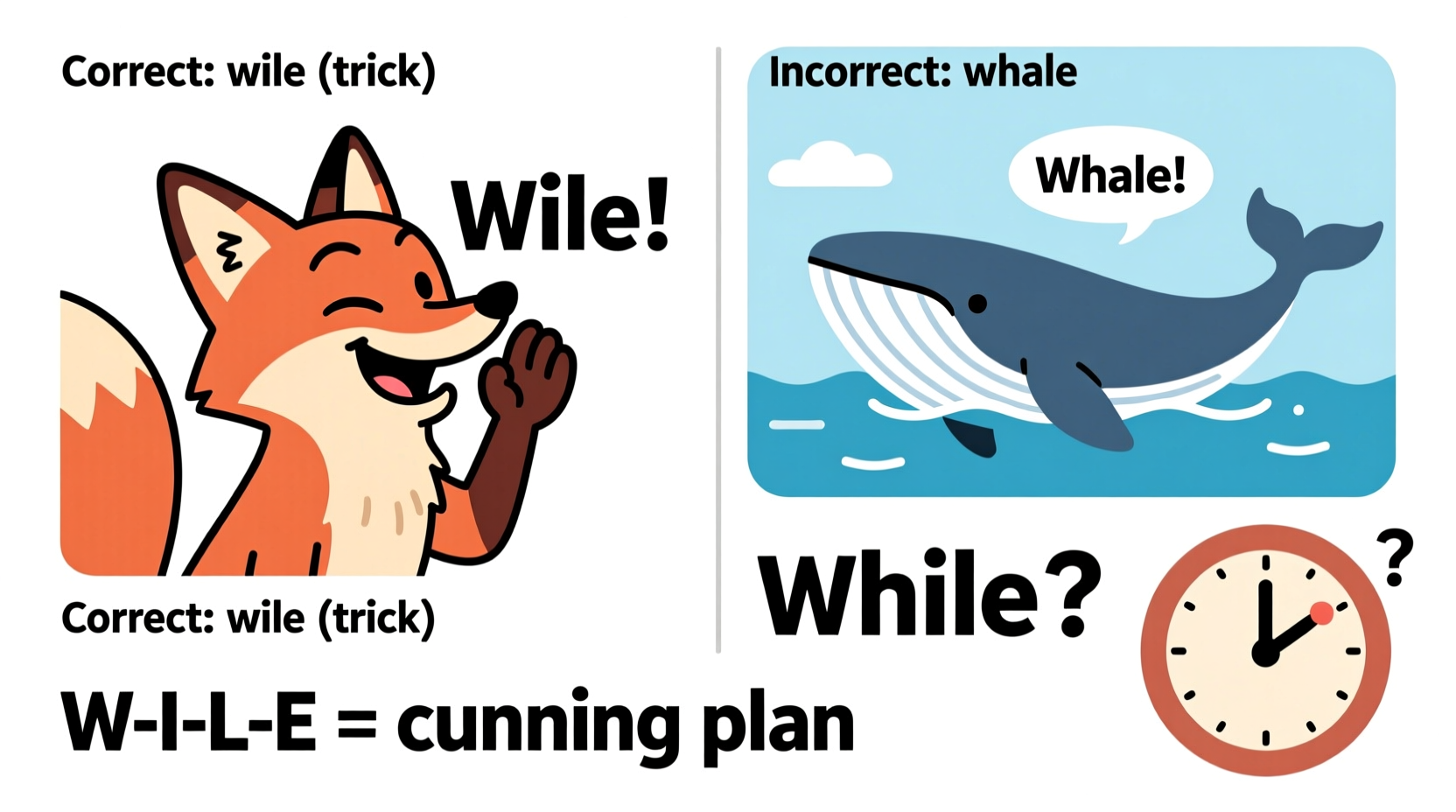The English language is full of words that sound alike but differ in meaning and spelling. One such word is \"wile,\" often misspelled due to its phonetic similarity to \"while\" or mistaken for \"wild.\" Getting the spelling right isn't just about grammar—it affects clarity, tone, and credibility in both professional and casual writing. Understanding how to spell *wile* correctly and when to use it can sharpen your communication skills and prevent embarrassing errors.
Understanding the Word: What Does “Wile” Mean?

\"Wile\" is a noun that refers to a clever or cunning trick used to deceive or entice someone. It carries a subtle, strategic connotation—often associated with charm, manipulation, or guile rather than brute force. For example:
- “She won his trust through flattery and gentle wiles.”
- “The fox escaped using ancient animal wiles.”
In rare cases, “wile” can also be used as a verb, meaning to lure or entice someone gradually, usually with charm or deception. Example: “He wiled her into signing the contract with promises of quick returns.” This usage is less common today but still valid in literary or expressive contexts.
“Language precision begins with understanding not just how a word is spelled, but what it truly means.” — Dr. Lydia Chen, Linguistics Professor at Boston University
Common Confusions: Wile vs. While vs. Wild
Mistaking “wile” for “while” or “wild” is a frequent error, especially in fast typing or dictation. These words are homophones or near-homophones, making them prone to mix-ups. Here's how they differ:
| Word | Part of Speech | Meaning | Example Sentence |
|---|---|---|---|
| Wile | Noun (sometimes verb) | A trick or stratagem intended to deceive or charm | “The negotiator used psychological wiles to gain an advantage.” |
| While | Conjunction or noun | During the time that; although; a period of time | “She read the report while waiting for the meeting.” |
| Wild | Adjective | Untamed, disorderly, or unrestrained | “The storm unleashed wild winds across the coast.” |
Confusing these words changes the meaning entirely. Writing “He escaped through sheer wild” instead of “He escaped through sheer wile” creates confusion. Similarly, “I was entertained by her while” makes no sense where “I was entertained by her wiles” fits perfectly.
Step-by-Step Guide to Spelling “Wile” Correctly
Spelling “wile” accurately requires more than memorization—it demands awareness and practice. Follow this five-step process to internalize the correct spelling and usage:
- Break down the word: W-I-L-E. Note that it ends with “-ile,” like “smile” or “style,” not “-ile” as in “while” (which shares the spelling but not the meaning).
- Pronounce it slowly: /waɪl/—rhymes with “smile,” “file,” and “isle.” Emphasizing the long “i” sound helps distinguish it from “wild” (/waɪld/), which has a hard “d” ending.
- Use mnemonic devices: Think: “A wile can make you smile—but only if you fall for it.” Associating “wile” with “smile” reinforces the silent “e” and soft ending.
- Practice in sentences: Write three original sentences using “wile” as a noun and one as a verb. Example: “The diplomat’s wiles defused the crisis.”
- Review common errors: Re-read your writing specifically looking for “wile” vs. “while/wild.” Use your word processor’s find function to catch potential typos.
Real-World Example: A Case of Misused “Wile”
Jamal, a marketing copywriter, drafted an email campaign highlighting a client’s negotiation tactics. He wrote: “They closed the deal using smart whiles and persistence.” His editor flagged the sentence immediately. “Whiles” isn’t a word. Jamal meant “wiles.” The corrected version read: “They closed the deal using smart wiles and persistence.”
This small error could have undermined the professionalism of the message. Readers might have questioned the brand’s attention to detail. After the correction, the sentence conveyed sophistication and strategic prowess—exactly the image the client wanted. This case illustrates how one misheard syllable can distort meaning and impact credibility.
Checklist: Ensuring You Spell “Wile” Correctly
Before finalizing any piece of writing, run through this checklist to avoid spelling traps:
- ✅ Confirm you’re using “wile” to mean a clever trick or charm.
- ✅ Double-check that you haven’t typed “while” or “wild” by mistake.
- ✅ Read the sentence aloud—does “wile” sound right in context?
- ✅ Look for plural usage: “wiles” (not “whiles”) when referring to multiple tricks.
- ✅ Use spellcheck—but don’t rely on it alone. Most tools won’t catch wrong-word errors like “while” used for “wile.”
Frequently Asked Questions
Is “wile” ever spelled with an ‘h’ like “while”?
No. “Wile” is always spelled W-I-L-E. Although it sounds similar to “while,” it is a different word with a distinct origin and meaning. Adding an ‘h’ turns it into “while,” which serves grammatical functions related to time or contrast.
Can “wile” be used in modern conversation, or is it outdated?
While “wile” is more common in literary, historical, or formal writing, it remains in active use. Phrases like “feminine wiles” or “political wiles” appear regularly in journalism and commentary. It’s not archaic, but it does carry a nuanced, slightly dramatic tone.
What’s the plural of “wile”?
The plural is “wiles.” For example: “He defeated his opponent with political wiles.” Never use “whiles”—this is always incorrect.
Expert Insight: Why Precision Matters
According to lexicographer Mark Renfro, “Words like ‘wile’ may seem minor, but their misuse reveals a gap in linguistic awareness. Readers subconsciously judge clarity and intelligence based on word choice. Using ‘wiles’ correctly signals not just education, but attention to nuance.”
“The right word, precisely placed, can shape perception. ‘Wile’ isn’t just spelling—it’s strategy.” — Mark Renfro, Senior Editor at American Lexicon Review
This insight underscores that spelling isn’t merely mechanical. It’s part of effective expression. Choosing “wile” over “wild” or “while” reflects intentional communication.
Final Tips for Mastering Tricky Words Like “Wile”
To strengthen your command of easily confused words, adopt these habits:
- Keep a personal confusion log: Track words you commonly mix up—like “wile/while,” “affect/effect,” or “their/there.” Review it weekly.
- Read aloud: Hearing your own words helps catch awkward or incorrect phrasing.
- Use context-based flashcards: Instead of memorizing definitions, create cards with full sentences showing correct usage.
- Subscribe to word-of-the-day services: Many focus on underused but powerful terms like “wile,” helping expand vocabulary naturally.
Conclusion: Take Control of Your Language
Spelling “wile” correctly is more than a technical skill—it’s a mark of thoughtful communication. Whether you're crafting an email, writing a novel, or preparing a presentation, using the right word builds trust and clarity. By understanding the distinctions between “wile,” “while,” and “wild,” practicing deliberate spelling techniques, and learning from real-world examples, you equip yourself to write with confidence and precision.









 浙公网安备
33010002000092号
浙公网安备
33010002000092号 浙B2-20120091-4
浙B2-20120091-4
Comments
No comments yet. Why don't you start the discussion?